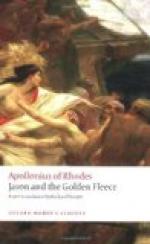Now when they had left the curving shore of the harbour through the cunning and counsel of prudent Tiphys son of Hagnias, who skilfully handled the well-polished helm that he might guide them steadfastly, then at length they set up the tall mast in the mast-box, and secured it with forestays, drawing them taut on each side, and from it they let down the sail when they had hauled it to the top-mast. And a breeze came down piping shrilly; and upon the deck they fastened the ropes separately round the well-polished pins, and ran quietly past the long Tisaean headland. And for them the son of Oeagrus touched his lyre and sang in rhythmical song of Artemis, saviour of ships, child of a glorious sire, who hath in her keeping those peaks by the sea, and the land of Iolcos; and the fishes came darting through the deep sea, great mixed with small, and followed gambolling along the watery paths. And as when in the track of the shepherd, their master, countless sheep follow to the fold that have fed to the full of grass, and he goes before gaily piping a shepherd’s strain on his shrill reed; so these fishes followed; and a chasing breeze ever bore the ship onward.
And straightway the misty land of the Pelasgians, rich in cornfields, sank out of sight, and ever speeding onward they passed the rugged sides of Pelion; and the Sepian headland sank away, and Sciathus appeared in the sea, and far off appeared Piresiae and the calm shore of Magnesia on the mainland and the tomb of Dolops; here then in the evening, as the wind blew against them, they put to land, and paying honour to him at nightfall burnt sheep as victims, while the sea was tossed by the swell: and for two days they lingered on the shore, but on the third day they put forth the ship, spreading on high the broad sail. And even now men call that beach Aphetae[1] of Argo.
[Footnote 1: i.e. The Starting.]
Thence going forward they ran past Meliboea, escaping a stormy beach and surf-line. And in the morning they saw Homole close at hand leaning on the sea, and skirted it, and not long after they were about to pass by the outfall of the river Amyrus. From there they beheld Eurymenae and the sea-washed ravines of Ossa and Olympus; next they reached the slopes of Pallene, beyond the headland of Canastra, running all night with the wind. And at dawn before them as they journeyed rose Athos, the Thracian mountain, which with its topmost peak overshadows Lemnos, even as far as Myrine, though it lies as far off as the space that a well-trimmed merchantship would traverse up to mid-day. For them on that day, till darkness fell, the breeze blew exceedingly fresh, and the sails of the ship strained to it. But with the setting of the sun the wind left them, and it was by the oars that they reached Lemnos, the Sintian isle.




